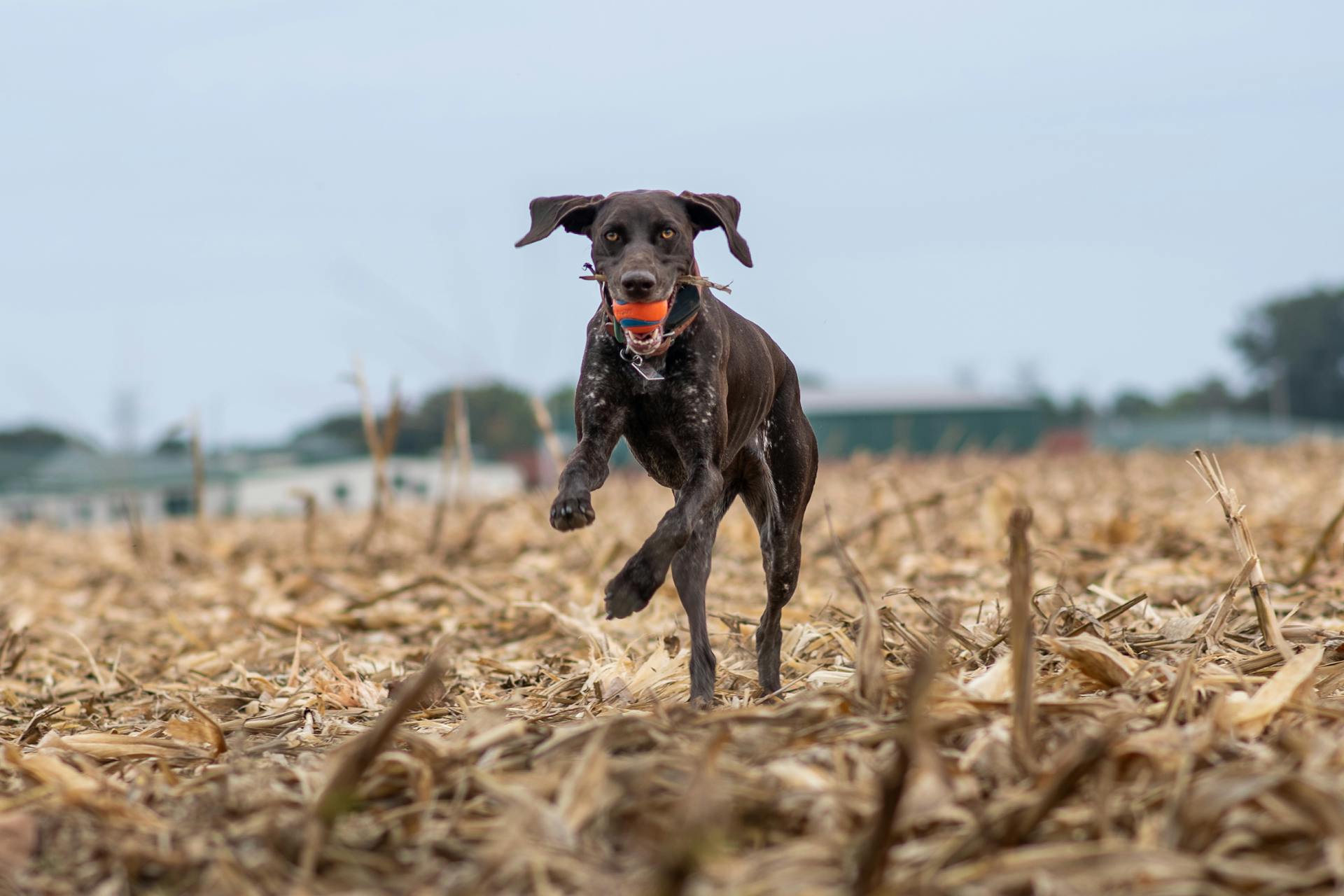
German Shorthaired Pointers are a high-energy breed that requires early socialization and training to prevent aggression.
Their strong prey drive and hunting instincts can lead to territorial behavior if not properly managed.
To prevent aggression, it's essential to establish a strong bond with your GSP from an early age.
Early socialization, starting from 8 weeks old, can help your GSP become confident and calm in new situations.
Causes of Aggression
Aggression in German Shorthaired Pointers can be caused by several factors. Temporary aggression can occur if a dog is pushed past its point of tolerance. This is not necessarily pathological, but rather a natural response to stress or frustration.
Dogs may redirect their aggression towards humans or other dogs if they are fearful or frustrated. Fearful dogs need to gain confidence and trust in their human handlers, while frustrated dogs need to be allowed to vent pent-up energy and avoid triggering events.
Some common signs of resource guarding include growling or snapping, stiff body posture, and refusal to share. These behaviors can be a sign that a dog is trying to protect its resources.
Behavioral Causes
Behavioral causes of aggression in German Shorthaired Pointers can be complex and multifaceted. Many dogs, even typically sweet-tempered ones, may show temporary aggression if pushed past the point of tolerance.
Not all aggression is unexpected or pathological. In fact, it's common for dogs to have individual triggers based on past experiences or lack of socialization.
Understanding your German Shorthaired Pointer's unique triggers is key to addressing aggression. This involves observing your dog closely and taking note of which situations cause them to become aggressive.
Some common triggers include the presence of other dogs or pets, approach of family members, especially children, and sudden movements or loud noises near the guarded resource.
Can High Energy Lead to Aggression?
High energy alone doesn't lead to aggression in German Shorthaired Pointers (GSPs).
However, if not channeled correctly, this energy can result in destructive or unwanted behaviors. Regular exercise and mental stimulation can prevent such issues.
GSPs are high-energy dogs that require a lot of physical and mental activity to stay happy and healthy.
Not all aggression amongst GSPs is unexpected or pathological; many dogs, even typically sweet-tempered GSPs, may show temporary aggression if pushed past the point of tolerance.
This means that a GSP's high energy can sometimes lead to temporary aggression if it's not managed properly.
Understanding Aggression
GSPs are not naturally aggressive dogs, but they can develop aggression due to various reasons. They're actually known for being playful and intelligent, with immense loyalty to their families.
Fearful or frustrated GSPs may redirect their aggression towards humans or other dogs. This can be due to a lack of confidence or trust in their human handlers, or pent-up energy that needs to be released.
GSPs can have individual triggers based on past experiences or lack of socialization, so it's essential to observe your dog's body language and seek professional guidance if unsure about specific behaviors.
Social Linked to Dominance
Social behavior in German Shorthaired Pointers is closely linked to dominance issues. Dog-on-dog aggression is often seen in multi-dog households in which GSPs fight to establish dominance and a working social hierarchy.
Mild bouts of rough play can be a normal part of their socialization process, but it's essential to recognize the difference between roughhousing and actual aggression. GSPs who are injuring other dogs should receive professional intervention to address the underlying dominance issues.
You might like: German Wirehaired Pointer Health Issues
It's not uncommon for GSPs to engage in dominance battles, but it's crucial to recognize the signs of aggression and take action to prevent injury to other dogs. By understanding their body language and seeking professional guidance, you can help your GSP establish a positive social hierarchy.
Changes in their surroundings or routine can also trigger anxiety in GSPs, which may be mistaken for aggression. Introducing them to various environments early on can help them become adaptable and reduce nervousness or reactive behaviors.
By being aware of these social dynamics and taking steps to address dominance issues, you can help your GSP become a more confident and well-adjusted member of your family.
Discover more: Dog anti Social Behaviour
Understanding Your Dog's Behavior Triggers
Understanding your dog's behavior triggers is key to preventing aggression and creating a harmonious home environment. Identifying the specific triggers that cause your German Shorthaired Pointer to display aggressive behavior is crucial.
Fearful or frustrated GSPs may redirect their aggression towards humans or other dogs, making it essential to address these underlying issues. To gain confidence and trust, fearful GSPs need to be socialized and gain experience in new environments.
Frustrated GSPs, on the other hand, need to be allowed to vent pent-up energy and avoid triggering events, such as fence-fighting. This can be achieved by providing adequate exercise and mental stimulation.
Resource guarding in GSPs is often triggered by specific events, including the presence of other dogs or pets, approach of family members, especially children, and sudden movements or loud noises near the guarded resource. Understanding these triggers allows you to manage the environment effectively and prevent incidents.
Some common triggers that might cause aggression in GSPs include past experiences or lack of socialization. It's essential to observe your GSP, understand its body language, and seek professional guidance if unsure about specific behaviors.
Here are some common triggers that might cause aggression in GSPs:
- The presence of other dogs or pets
- Approach of family members, especially children
- Sudden movements or loud noises near the guarded resource
Changes in their surroundings or routine can also make GSPs anxious, which might be mistaken for aggression. Introducing them to various environments early on can help them become adaptable and reduce any nervousness or potential reactive behaviors.
Prevention and Training
Socialization is key to preventing aggressive tendencies in German Shorthaired Pointers (GSPs). Exposing them to various people, pets, and situations from a young age ensures they’re well-adjusted and confident, reducing wariness or behaviors that can be misconstrued as aggression.
Fearful or frustrated GSPs may redirect their aggression towards humans or other dogs, so it's essential to address these issues promptly. Fearful GSPs need to gain confidence and trust in their human handlers, while frustrated GSPs need to be allowed to vent pent-up energy and avoid triggering events.
Trying to solve GSP aggression by force or showing them who's boss only makes things worse. Experienced dog trainers and vet-recommended animal behaviorists are the best professionals to help your GSP become a well-adjusted, balanced, non-aggressive dog.
Proper socialization can make GSPs more accepting of strangers, and any protective instincts are usually a display of loyalty rather than outright aggression.
Resource Guarding and Territorial Behavior
Resource guarding is a serious issue in German Shorthaired Pointers, and it's essential to recognize the signs early on. Many owners mistakenly encourage this behavior in their puppies and juvenile GSPs, thinking it's cute, but it can escalate into aggression.
Growling, snapping, and stiff body posture are common signs of resource guarding in GSPs. If your dog growls or snaps at you or others when they approach their food bowl or toys, it may be a sign that they are trying to protect their resources.
Resource guarding can manifest in different ways, including refusal to share toys or treats. If your GSP refuses to share with you or other dogs, or becomes agitated when you try to take something away from them, it could be a sign of resource guarding.
Understanding the triggers of aggression in GSPs is crucial in addressing resource guarding. Like all dogs, GSPs can have individual triggers based on past experiences or lack of socialization. It's essential to observe your GSP, understand its body language, and seek professional guidance if unsure about specific behaviors.
Here are three signs that your German Shorthaired Pointer may be resource guarding:
- Growling or snapping
- Stiff body posture
- Refusal to share
Early intervention is key to preventing resource guarding from becoming a more serious problem. By working with a qualified dog trainer or behaviorist, pet owners can successfully address resource guarding and prevent it from escalating into a more serious issue.
Territorial behavior in GSPs is also worth noting. While they may be wary of unfamiliar faces, proper socialization can make them more accepting of strangers. Any protective instincts are usually a display of loyalty rather than outright aggression.
Handling Aggressive Behavior
Uncontrolled aggression in a GSP is a serious issue that must be dealt with promptly to prevent injury to humans or other animals.
Experienced dog trainers and vet-recommended animal behaviorists are the best professionals to help your GSP become a well-adjusted, balanced, non-aggressive dog.
Socialization is vital for GSPs, exposing them to various people, pets, and situations from a young age ensures they're well-adjusted and confident, reducing wariness or behaviors that can be misconstrued as aggression.
Changes in a GSP's surroundings or routine can make them anxious, and in some cases, this anxiety might be mistaken for aggression.
To address aggressive behavior, you need to figure out what the cause is, and unfortunately, your dog cannot talk, so you'll have to pay careful attention to their behaviors.
Some common types of aggression in GSPs include dog-to-dog aggression, dog-to-human aggression, resource guarding, territorial aggression, fear-based aggression, pain-induced aggression, redirected aggression (frustration), and maternal aggression.
To manage and prevent aggressive behavior, it's essential to observe your GSP's body language and understand their triggers, which can include the presence of other dogs or pets, approach of family members, sudden movements or loud noises near the guarded resource, and more.
Here are some signs that your GSP may be resource guarding:
- Growling or snapping
- Stiff body posture
- Refusal to share
If you notice any of these signs, it's crucial to address the issue promptly to prevent it from escalating into a more serious problem.
In some cases, biting may not be an aggressive act, but it's essential to pay attention to the context and body language surrounding the biting behavior.
If you see your German Shorthaired Pointer biting in an aggressive manner, then it's time to seek the assistance of a dog behaviorist.
Frequently Asked Questions
What are the disadvantages of German Shorthaired Pointers?
German Shorthaired Pointers require a lot of exercise and mental stimulation, making them a high-maintenance breed for active owners only
Sources
- https://gspowners.com/2021/11/04/why-is-my-german-shorthaired-pointer-so-aggressive/
- https://www.doggoneproblems.com/gus_gsp/
- https://iheartdogs.com/are-german-shorthaired-pointers-aggressive/
- https://iheartdogs.com/7-strategies-to-stop-your-german-shorthaired-pointers-resource-guarding/
- https://www.houndgames.com/german-shorthaired-pointer-aggression/
Featured Images: pexels.com


